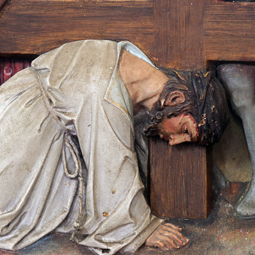Failing and Falling
I’m reminded of our failing and falling whenever I walk through the Stations of the Cross.

There is an old saying that it does not matter how often you fall — it matters how often you get up.
I’m reminded of our failing and falling whenever I walk through the Stations of the Cross, for in the pattern of his passion, Jesus falls three times on his way up the hill of sacrifice.
The three falls of Jesus picture his human weakness, but everything in the story can be pressed for deeper meaning; and the three falls connect with three ways we fail and three times we fall within our frail humanity.
First, we fail in our physicality. We’re lazy. We eat too much of the wrong stuff and too little of the good stuff. We take the wormy bait of artificial happiness that drink and drugs offer. We pant after sex for recreation rather than procreation.
We want stimulation and entertainment rather than motivation and service. We wallow in our sordid desires and stumble and fall time and again, not just three times, but, it seems like, every time.
Second, we fail in our minds. We think the wrong things. We’re confused and ignorant and don’t take the trouble to learn. We don’t even know what we don’t know.
We jump to conclusions and judge other people without knowing the facts. We gossip and grumble. We get the wrong end of the stick, misread the situation, glory in our ignorance and defend our bigotry with obnoxious self-righteousness. We allow our minds to fall into a kind of crass craziness and then defend our narrow opinions as if they are divinely given.
Third, we fail in our hearts and souls. God has made us to be in love with him, but we would rather be in love with ourselves. God has made us to be a little less than the angels, but we choose to be little more than apes.
God has made us to be everlasting connoisseurs of beauty, truth and goodness, but we are content to be creatures of dust and dirt.
Oscar Wilde said, "We are all in the gutter, but some of us are gazing at the stars." I suggest that we were made to sing among the stars but we prefer to slum it in the gutter.
When I see Jesus fall the first time, therefore, I see my father Adam and his lovely spouse, Eve, just after the first fall of humanity itself. There in the garden, where all was perfect, they fell not by doing such a terrible deed but by a little act of disobedience that seemed right at the time.
What could be wrong in gaining some knowledge and being like God himself? It seemed like a tiny act of disobedience to them, not knowing that every act of disobedience is monumental.
Then, when I see Jesus fall the second time, I see that I myself have followed the pattern of my fallen father — like Adam, I have sinned and fallen short of the glory of God. For that is what sin is — not simply the naughty things we do; not simply the sordid and shameful secrets or the moments of lust and rage.
Sin is not just the greed, the gossip and the grimy little deeds of meanness. Instead, sin, as St. Paul teaches, is falling short of the glory of God.
St. Irenaeus of Lyon teaches us, "The glory of God is a human being fully alive." Therefore, to sin is to be less than fully alive. To sin is to live in a netherworld — to be a sort of selfish zombie — locked in a coffin of egotism by day and roaming restlessly as a creature of the night.
To attain God’s glory, therefore, is to leave that life behind, to die to that life in order to become fully alive.
The third time I see Jesus fall, therefore, is to see him gather Adam’s fall and my fall up into his passion. He walks through the dark night of our humanity and emerges triumphant. In doing so, he shows my father Adam and me the way through the valley of shadow back into the garden of innocence restored.
He gathers up my physical frailty and restores it, if I allow, to the state of his own glorious body. He gathers up my mental failure and renews my mind in the image of eternity. He gathers up my spiritual failure, and, through the will of his Father and the power of his passion, he allows me to share in a new dimension of reality.
Saying it does not matter how often you fall but how often you get up is not much more than a calendar quote or a self-benefitting bromide.
Saying how often you get up in the power of Jesus Christ, who falls and gets up with you — on the other hand — is the key to transformation and the first step to victory.
Father Dwight Longenecker’s latest book is
The Romance of Religion. Visit his blog, browse his
books and be in touch at DwightLongenecker.com.
- Keywords:
- April 6-19, 2014
















